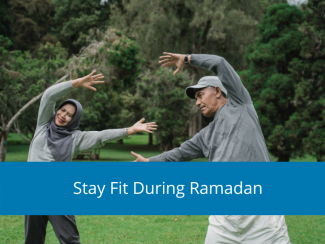
Ramadan is observed by Muslims worldwide as a holy month of fasting and abstinence. However, doing some light exercise when fasting is a good thing – it helps to keep the muscles strong and blood circulating. Here are some tips to stay healthy and fit during Ramadan.
Abstaining from food and water during the hot summer month of Ramadan can be challenging. Many people skip their daily schedule of exercise and workout. Going to the gym on an empty stomach, without any water and sleep-deprived may not be possible for all and some people think that they should discontinue all exercises during this phase. However if you don't exercise and don't eat healthy, it is possible to put on weight during Ramadan as well as lose muscle.
Hence, doing some light exercise when fasting is a good thing – it helps to keep the system working and blood circulating. Ramadan is actually one of the best time to regulate or get into a fitness routine that might even help you lose some kilos on the way. Though there is no right or wrong answer. It largely depends on how you feel and how in tune you are with your body.
Exercise Timing
It’s important to find out what works best for you. You may find that you perform better doing light weight training on an empty stomach, or that you feel more energised doing cardio after a light iftar meal.
Suhoor refers to the meal consumed early in the morning before fasting.
Iftar is the evening meal when Muslims end their daily Ramadan fast at sunset.
Exercise after Iftar
The best time to train is after Iftar. Your body has been refuelled with a meal and therefore has the energy and hydration to go through a workout. Though training before Iftar can certainly be done – but you will just need to be more conservative with your workout rigour. As your carbohydrate levels will be very low at this time, you won’t have as much energy as you normally would.
Exercise before Suhoor
During Ramadan, a lot of people like to workout before Suhoor as that way they can have enough water and eat right after. It takes a little effort to wake up early, but at least you aren't at risk of dehydration. If you’re not fussed about having strange sleeping hours this will be the most effective time to fit in a work out. You can replenish your protein and nutrient levels afterwards as well as be able to drink fluids during the workout itself.
There is no perfect time to exercise during Ramadan, it’s all about what works for you.
Here are some tips to help you get more effective exercise and still keep you energetic to take on your day.
Continue doing small exercises
Aim to get some form of exercise no matter how small it is. It could just be a walk around the house. Avoid doing very intense workouts during the day that could burn you out. Find your ideal fitness activity.
Find a convenient time
Find a time that is convenient for you and where your body is comfortable. You can try exercising 2 hours after breaking your fast since you will have digested the food in your body by then.
Know when to Stop
Take longer rest times for each set or reduce the repititions so that your body can have time to recover. Listen to your body, if you can’t continue the workout then it is fine to stop.
Try to cut down on sugary and processed foods
Avoid heavily processed, fast-burning foods that contain refined carbohydrates such as sugar and white flour, as well as fatty foods like Ramadan desserts. They are high in fat and low in nutrients.
Related Reading: 6 Health Hazards of Fasting to Avoid during Ramadan
Stay hydrated
Drink at least 8-12 cups of water a day. Drink plenty of fluids for hydration from the period of Iftar to the time of Suhoor. Beware of consuming a lot of popular sugary Ramadan drinks such as Tamarind and Hibiscus. Although juices, milk and soup are sources of fluids, water is the best choice. Consume other drinks in moderation.
Avoid caffeinated drinks
Caffeine is a diuretic that stimulates faster water loss, leading to dehydration. It is best to avoid caffeinated drinks such as strong tea, coffee and colas, or drink them in moderation.
Related Reading: Ramadan Fasting Tips for People with Diabetes
Not Sleeping Enough
Short nights can cause sleep deprivation. This can kill your motivation to go to the gym. Consider naps.
The month of Ramadan is all about the training. Train to eat mindfully, sleep well and exercise moderately every day.






